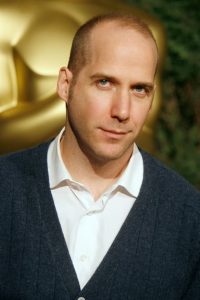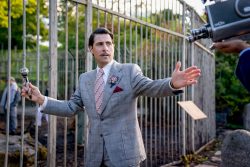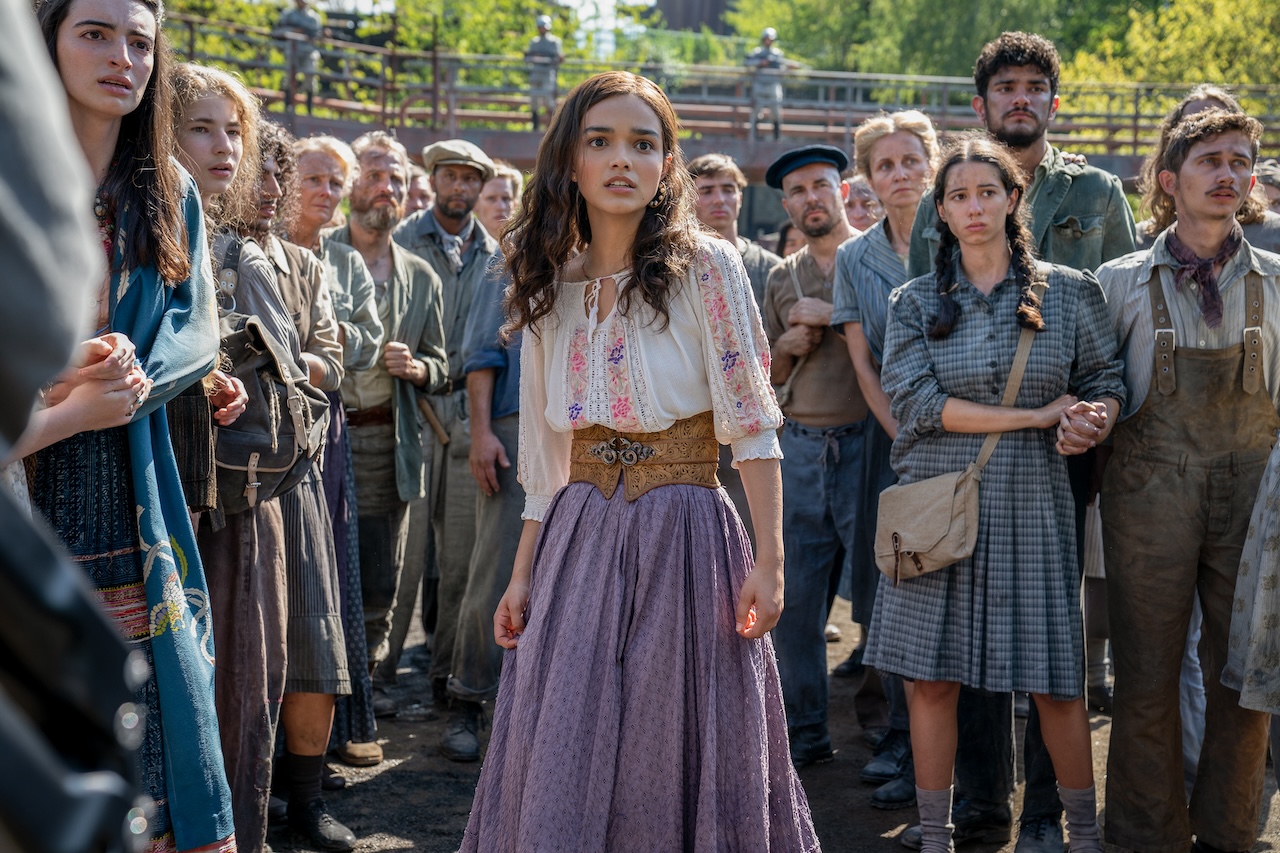- Michael Arndt & Michael Lesslie Discuss Writing The Next Chapter Of The Suzanne Collins Novel Series – The Hunger Games: The Ballad of Songbirds & Snakes (Part 1)
- Michael Arndt & Michael Lesslie Discuss Writing The Next Chapter Of The Suzanne Collins Novel Series – The Hunger Games: The Ballad of Songbirds & Snakes (Part 2)
“I’m pretty much a structure obsessive, but if anyone’s more obsessed with the story structure than me, it would be Suzanne Collins who wrote the novels,” says screenwriter Michael Arndt. “She breaks everything down into thirds. Most books are 27 chapters long each with three components. She’s working within the context of a story for younger YA readers and she’s trying to talk about serious moral issues in a clear way that the kids can get.”
“She was very clear about the origins of the central underlying thematic or philosophical question of the story. The story is based on Thomas Hobbes’ Leviathan, who expounded the need for a strong state that’s going to control people to stave off anarchy and chaos.” John Locke, another political theorist who opposed him, believed that society should be ruled by the consent of the governed. This futuristic piece of pop allegory examines these two juxtaposing views of government. This is central theme of The Ballad Of Songbirds & Snakes.
“The characters represent states of thought in Suzanne’s world,” adds Michael Lesslie. “A YA world that is big and entertaining that can reach a huge number of people, but also deal with characters who are complex, conflicted, and dealing with very serious real-world issues, is a rarity. A successful YA film also doesn’t talk down to its audience.”
The Hunger Games Universe
“The Hunger Games Universe is ruled by fear and paranoia,” states Michael Arndt. “The characters almost never say exactly what they’re thinking. It’s fine in the novel in which you have an internal monologue going on.”
“But, it’s very tricky putting that kind of behavior on a screen, because the characters are very recessive and very hidden. And even when, for example, Coriolanus (Tom Blyth) and Lucy Gray (Rachel Zegler) come together and sort of have their first kiss moment, he’s asking, ‘Is this real?’ They second guess each other, but they also second guess themselves.”
“I feel like one of the reasons that The Hunger Games is so successful is that Katniss (Jennifer Lawrence) from the first three movies is a very self-doubting, insecure character. She doesn’t think of herself as ‘one of the good guys.’ She always saw herself as trying to survive and when she was in the romantic triangle with Peeta and Gale she felt very confused and not ready to make a decision. She would have all this ambivalence about who she wasn’t, and what she was doing, but when the chips came down she always did the right thing. I think a lot of audiences, especially YA audiences, very much identify with that.” Lucy Gray also possesses many of these traits of self discovery.

Michael Arndt
“There’s a sense of being lost and a sense of uncertainty about yourself. You don’t know how to behave or whether you should play along with society’s rules or whether you should rebel against them or not.”
All the heroes and anti-heroes in The Hunger Games are basically adolescents in their late teens finding their way in the world. Many decisions they make aren’t based on life experience, but on the available choices. As they get older, their choices will become more predictable and informed.
Rebel Heroes
The challenging of government forces is presented through rebel heroes such as Katniss in Catching Fire, and Coriolanus Snow (Tom Blyth) and songstress Lucy Gray Baird (Rachel Zegler) in Ballad Of Songbirds & Snakes. “Heroes rise up and deal with the responsibilities of leadership and becoming a figurehead,” adds Lesslie. “I always think of the impact on oppressed cultures and analogize their situations in The Hunger Games. I think it’s that reach and that responsibility that actually just makes me want to double down even more strongly on the philosophical element,” he continues.
The metaphor of The Hunger Games can be extrapolated beyond oppressive governments into the “winner takes all” nature of modern unfettered capitalism where everyone is in constant competition rather than co-operation. “It becomes an allegory, not just for political power, but also for economic and corporate power,” states Arndt. All The Hunger Games movies are also about the fantasy of escape from these desperate conditions in pursuit of a more idyllic world.
The Games are pitched as an entertainment event and anyone is free to sign up. But The Tributes are forced into it because they are motivated by survival and can’t refuse.
“One of the things we tried to do in the Capital, was to affirm your own superiority by insisting on others’ inferiority in this system. It’s the way you survive, so watching the poor children from the districts be forced into this horrible situation affirms the fact that you’re not one of them and that you superior, safe and dominant,” adds Arndt.
Creating A Spectacle
Lucretius “Lucky” Flickerman, The Carnival Barker MC of The Games (played by the colorful Jason Schwartzman), entices the engaged audiences to bet big on the high-rating reality show. The perverse enjoyment derived from human suffering harks back to the days of the Roman King Nero feeding Christians to the lions in the Coliseum.

Lucretius ‘Lucky’ Flickerman (Jason Schwartzman) Photo by Murray Close
Michael Arndt describes the purpose of the Games going from “punishment to spectacle.” A fixating feast for the eyes is a political strategy to keep the audience passive and engaged. Arndt notes that in the book, “Coriolanus is instrumental in this and saying that it’s not just going to be a spectacle of suffering. ‘We’re going to try and get people rooting. We’re going to try and get them invested,‘” notes Arndt.
Overwhelming and desensitizing your audience with spectacle, distracts them from them being active citizens who can take control of their world into being passive consumers lacking in human empathy.
The appropriately named, Dr. Volumnia Gaul (Viola Davis) expands on this notion of a consumption-based economy. “Dr. Gaul’s agenda with this and the capitalist agenda has always had to be about desensitization by exposure,” adds Lesslie. “We come to it in this culture where we have seen an enormous amount of violence on screen, and the interplay between fast editing and spectacle, and making it all feel like entertainment. And then, the brutal reality underneath it unfolds.” These concepts underscore the propagandist themes of The Hunger Games.
The safety of observing from the Coliseum or via livestream allows the audience to experience the Games vicariously without having to suffer themselves. “People feel an enriched and elevated dramatic inner life, but can walk away at the end and go and have a cup of tea and a slice of cake in the Capital,” muses Arndt. “It’s that sense of allowing people to watch drama whilst ultimately controlling them.” Well-fed people are less likely to rebel.
Writing The Ballad Of Songbirds & Snakes
Michael Arndt co-write Catching Fire with Simon Beaufoy, so is well-versed in The Hunger Games world and well-positioned to write Songbirds & Snakes. This is Michael Lesslie’s first foray into the franchise. He’s a trained playwright so his primary focus is on character relationships.
Says Lesslie, “They were about two weeks away from production on The Hunger Games and they wanted me to do a pass of the script. I spent four weeks on it. I was not trying to be very free in my adaptation. I was just trying to be as faithful to the book as possible, to the characters, the story, and the themes.”
Much of Arndt’s primary role was writing and revising a screenplay based on a 500 page book into a 150 page screenplay. “I had to sit down and make up a full outline and a whole story. It was almost like a game of Jenga where I’m trying to go through and find out how much I can take out of the outline. I think one of the unsung, or one of the least appreciated aspects of screenwriting, is trying to keep things as concise as possible.”
“I had cut everything down to the bone. So, for the first set revisions, the second draft, director Francis Lawrence, producer Nina Jacobson, and author Suzanne Collins all weighed in with the stuff that was missing. And so, I ended up adding stuff back and handed Michael Lesslie a 170 page draft to edit.”

Michael Lesslie
“I think Michael Arndt did a brilliant boil down of getting it down to the core dramatic elements and making choices that seemed inevitable like moving the snakes to the end of the games,” mentions Lesslie.
Other writing considerations included how to turn this into a singular movie character arc for Coriolanus, ensuring tonal consistency between the youth of the Capital.
“Suzanne Collins is very adamant in the book about staying with Coriolanus’ point of view,” adds Michael Arndt. “Once the Games begin and Lucy Gray is in the arena, she just disappears in the book and you’re in his head as she’s trying to think about where she goes and what’s going on. But you only see her as she sees her. So I decided I was just going to go ahead and follow her like once the games began in the first draft.” He basically split the story into points of view in that early draft.
Lucy’s navigating the catacombs of the stadium, hiding, getting water, and avoiding capture. “That was purely invented because it wasn’t in the book. “And then, they did something brilliant and invented a device of security cameras (added in later drafts) that had been placed in all the tunnels. And even if you were watching, even if you were with Lucy Gray, but there were no cameras around, it was still something that Coriolanus could imagine.”
“I think that it helped out a lot in terms of making the second act exciting because the reality is that Coriolanus is a very passive character through the games themselves. Michael Lesslie did a ton of work to try and make him more active, and at every point they’re both playing chess, trying to keep her alive’” continues Arndt. Activating Coriolanus to drive the narrative was a great deal of the work in the Arndt’s second draft.
The filmmakers also played with the idea of whether this action was actually happening or whether it was purely in Coriolanus’ imagination. This was extended into the final act where Lucy and Coriolanus are playing a cat and mouse game in the woods. “You hear him stalking her, and going, ‘Lucy Gray, where are you”, and you see her start singing. I just thought it was very effective narratively,” states Arndt.
